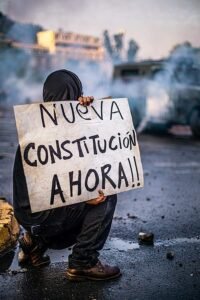Chileans voted on Sunday to reject a proposed conservative constitution marking the second time in just over a year that a replacement for the dictatorship-era charter was dismissed.
Last September, a progressive draft aiming to include environmental protections and Indigenous rights was also rejected. The proposed constitution that was voted down sought to strengthen property rights and uphold free-market principles.
At that time, however, Chile was undergoing a financial crisis exacerbated by the pandemic and resultant inflation which was then taken advantage of by the conservatives to claim that it would undermine property rights.
The proposed leftist constitution which was rejected actually took into consideration social, economic rights as well as gender and environment issues as well. However, it woas rejected more rigourously by the populace than the current one. Only 39% were in favour of the left proposed constitution.
Why do the Chileans want a new constitution?
The need for a new constitution in Chile arose due to the growing frustration with rising inequality despite three decades of democracy that followed Pinochet’s dictatorial rule. While this period brought about political stability and economic growth, large-scale protests erupted in 2019, involving students, pensioners, Indigenous peoples, and women’s rights activists. These groups felt disillusioned with the weak representation provided by traditional political parties and believed that policy changes were insufficient to address their concerns.

Matias Fernandez, CC BY-SA 4.0, via Wikimedia Commons
In response to these grievances, in October 2020, a significant majority of Chileans, four out of every five voted for elected delegates to write a new constitution. They hoped to create a new, more inclusive document that was considerate towards all the diverse groups of the population and addressed their concerns more efficiently.
Rejection of the latest text
The latest proposed text was rejected for being too conservative on the right. According to Jennifer Piscopo, a professor, the new document failed to address the economic and social concerns of the people. Gender issues have also been neglected in the text. It has also been reportedly rejected by the indigenous communities as well. The document has been described to be tough on crime and immigration while also undoing the gains made for women and LGBTQ rights.
According to reports, the rejection of the proposed constitution reflects the frustration of Chileans whose social and political needs are not adequately addressed which has lead to a deep division between the political elite and the general population. Discontent towards the politicians could be reflected in the Chileans rejection of proposed constitutions by the left and right.
The rejection of the proposed constitution, which was put forth by the Republican Party, indicates that Chile remains divided over fundamental issues.
The repeated rejection suggests that the people are actively participating by they are not satisfied with the amends that are being offered to them. It has been reported that all 15 million eligible Chileans had voted since it has been mandated. This suggests that the citizens want a constitution that corresponds to a diverse audience with a myriad of issues and effectively addresses them. A deep-seated frustration with the current system is observable.

Source: Paulo Slachevsky (CC BY-NC-SA )
There might not be another vote until 2025 when the term of the now elected President Boric will end. He has stated that instead of another vote he will focus on long term development. With the frustrated voter fatigued populace, it might not be feasible to hold another vote anyway but matters may change depending upon the presidential election.
Reportedly, it has been suggested that another constitution may only be proposed at the brink of a social uprising and that the country is likely to stick with the existing constitution for another decade.











Comments 1